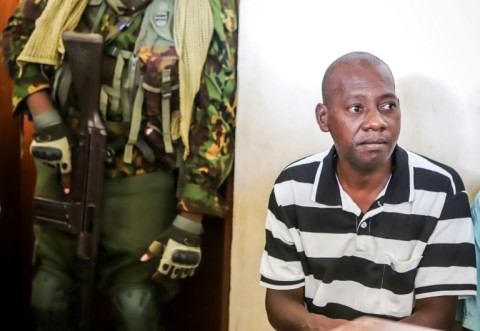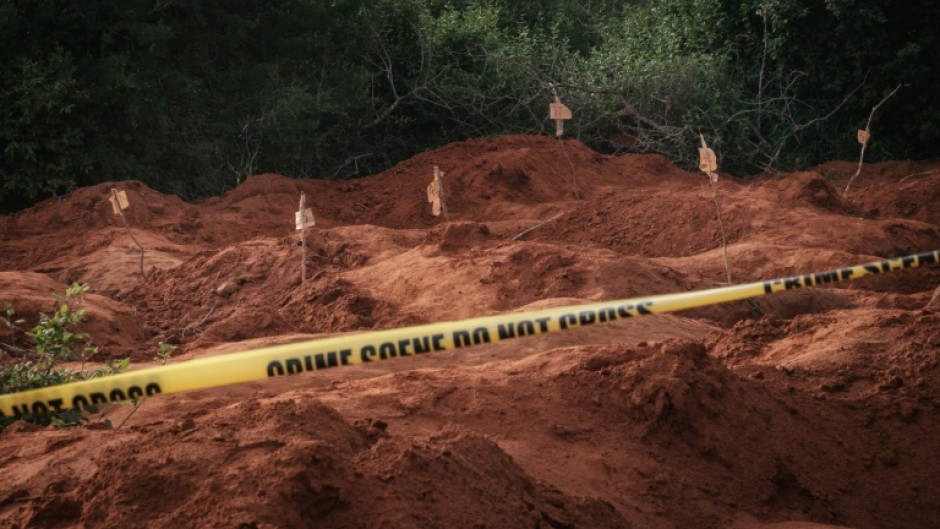MOMBASA - The leader of a Kenyan doomsday cult went on trial on Monday on charges of terrorism over the deaths of more than 400 of his followers in a macabre case that shocked the world.
Self-proclaimed pastor Paul Nthenge Mackenzie appeared in a packed courtroom in the Indian Ocean port city of Mombasa along with 94 co-defendants, accused of promoting an "extremist ideology" and running a well- organised criminal enterprise.
Mackenzie, a former taxi driver who was arrested in April last year, is alleged to have incited his acolytes to starve to death in order to "meet Jesus" in one of the world's worst cult-related massacres.
The father of seven and his co-accused pleaded not guilty at a hearing in January to charges of engaging in organised criminal activity, radicalisation and facilitating the commission of a terrorist act.
The 55 men and 40 women also face charges of murder, manslaughter, as well as child torture and cruelty in separate cases relating to the deaths which prosecutors say occurred over the years 2020 to 2023.
The remains of more than 440 people have been unearthed in a remote wilderness inland from the Indian Ocean coastal town of Malindi, in a case that has been dubbed the "Shakahola forest massacre".
Autopsies have found that while starvation appeared to be the main cause of death, some victims -- including children -- were strangled, beaten, or suffocated.
Previous court documents also said that some of the bodies had had their organs removed.
- 'Ruthless efficiency' -
Principle magistrate Leah Juma ordered the removal of journalists from the court shortly after the start of the hearing to enable a protected witness to take the stand in camera.
Prosecutors said in a statement that they planned to call about 90 witnesses to testify, and planned a visit to the vast crime scene.
"The prosecution will present evidence to illustrate that the accused did not function merely as a fringe group, but rather as a well-organised criminal enterprise operating under the guise of a church under the leadership of (Mackenzie)," the statement said.
It alleged that Mackenzie oversaw an "intricate governance system" including an armed militia that enforced his directives with "ruthless efficiency".
Mackenzie was arrested the day after police first entered Shakahola forest in April last year and found four bodies and several other starving people.
The police action came after a relative of one of the victims received a tip-off from a former member of Mackenzie's Good News International Church about grisly happenings in the forest.
Mackenzie had set up the church in 2003, but said he closed it in 2019 and moved to the sleepy town of Shakahola to prepare for what he had predicted would be the end of the world in August last year.
In March this year, the authorities began releasing some victims' bodies to distraught relatives after months of painstaking work to identify them using DNA.
Questions have been raised about how Mackenzie, a self-styled pastor with a history of extremism, managed to evade law enforcement despite his prominent profile and previous legal cases.

Interior Minister Kithure Kindiki last year accused Kenyan police of laxity in investigating the initial reports of starvation.
"The Shakahola massacre is the worst breach of security in the history of our country," he told a senate committee hearing, vowing to "relentlessly push for legal reforms to tame rogue preachers".
Reports by the Kenyan senate and a state-funded human rights watchdog have said the authorities could have prevented the deaths.
The Kenya National Commission on Human Rights (KNCHR) in March criticised security officers in Malindi for "gross abdication of duty and negligence".
The horrific saga in largely Christian Kenya threw a spotlight on failed efforts to regulate unscrupulous churches and cults that have dabbled in criminality.

